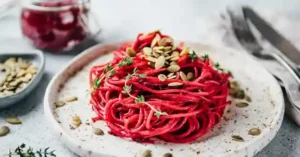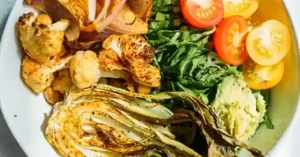Introduction & Why You’ll Love This Asian Chicken Salad Recipe
Asian Chicken Salad is the perfect balance of fresh, crisp textures and bold, zesty flavors. It combines tender, juicy chicken with crunchy vegetables, all tossed in a tangy sesame or soy-based dressing. Every bite bursts with a mix of sweet, savory, and slightly nutty notes that keep you coming back for more.
You’ll love this salad because it’s:
- Quick and easy: ready in under 30 minutes.
- Healthy yet satisfying: packed with lean protein, fiber, and vitamins.
- Versatile: great for meal prep, picnics, or a light family dinner.
- Customizable: adjust the dressing, add your favorite veggies, or swap the protein.

Ingredients Overview
The beauty of this Asian Chicken Salad lies in its simple yet flavorful ingredients. Each component plays a role in creating the perfect balance of taste, texture, and nutrition. Here’s what you’ll need:
For the Salad
- Cooked chicken breast or thigh meat:Shredded or diced; grilled, roasted, or rotisserie chicken works well.
- Cabbage: A mix of green and purple cabbage for color and crunch.
- Carrots: Julienned or shredded for sweetness and vibrant color.
- Bell peppers: Thinly sliced; choose red, yellow, or orange for extra sweetness.
- Cucumber: Adds a refreshing, crisp bite.
- Green onions: For a mild, savory kick.
- Fresh cilantro:Bright, fresh flavor that complements the dressing.
- Toasted almonds or cashews: Adds crunch and a nutty depth.
- Sesame seeds: Optional garnish for extra flavor and presentation.
For the Dressing
- Soy sauce:Provides savory umami flavor.
- Rice vinegar: Adds tanginess and balances the richness.
- Sesame oil: Gives the dressing its signature nutty aroma.
- Honey or maple syrup: A touch of sweetness to balance the acidity.
- Fresh garlic: Adds a sharp, aromatic note.
- Fresh ginger: Warm, slightly spicy undertone.
- Olive oil or neutral oil: Helps emulsify the dressing.
Notes & Tips About Ingredients
Use rotisserie chicken to save time. Swap peanut butter into the dressing for a Thai-inspired twist. For extra spice, add sriracha or red pepper flakes to the dressing. Mix in mandarin orange segments or edamame for added texture and flavor.

Popular Variations & Substitutions
One of the best things about Asian Chicken Salad is how easily you can adapt it to suit your taste, dietary needs, or whatever ingredients you have on hand. Here are some popular variations and swaps to try:
Protein Swaps
- Turkey:A lean alternative that works especially well with leftover holiday turkey.
- Shrimp: Light, flavorful, and pairs beautifully with the sesame dressing.
- Tofu or tempeh: Great vegetarian or vegan options; pan-sear or bake for added texture.
- Beef strips: Marinated and quickly stir-fried for a heartier version.
Vegetable Variations
Swap cabbage with romaine lettuce for a softer, milder crunch. Add snow peas, bean sprouts, or radishes for extra freshness. Use spiralized zucchini or carrot ribbons for a fun, noodle-like texture. Include cherry tomatoes or mango slices for a sweet, juicy twist.
Dressing Changes
- Peanut dressing: Blend peanut butter with soy sauce, lime juice, and honey for a creamy, Thai-inspired flavor.
- Chili-lime dressing: Add fresh lime juice and chili paste for a tangy-spicy kick.
- Ginger-miso dressing: Mix white miso with rice vinegar and sesame oil for a savory, umami-packed option.
Toppings & Crunch
Crispy wonton strips or tortilla strips for extra crunch. Pumpkin seeds or sunflower seeds as nut-free alternatives. Dried cranberries or pomegranate seeds for a sweet, tangy pop.

Step-by-Step Instructions
Making Asian Chicken Salad is quick and straightforward, but following the right order ensures the best flavor and texture. Here’s how to prepare it like a pro:
Step 1: Make the Dressing
In a small mixing bowl or jar, combine soy sauce, rice vinegar, sesame oil, honey, garlic, ginger, and olive oil. Whisk or shake well until the mixture is smooth and fully emulsified. Taste and adjust seasoning—add more honey for sweetness, vinegar for tang, or soy sauce for saltiness. Set the dressing aside to allow the flavors to meld while you prepare the salad.
- Tip: Make the dressing a few hours ahead for a richer flavor. Store it in the fridge and shake before use.
Step 2: Prepare the Salad Ingredients
Shred or chop cooked chicken into bite-sized pieces. Thinly slice cabbage, carrots, bell peppers, and cucumbers for an even texture. Chop green onions and fresh herbs (like cilantro). Toast almonds or cashews in a dry skillet over low heat for 2–3 minutes until lightly golden.
- Tip: Use a mandoline or food processor with a slicing attachment for perfectly thin, uniform cuts.
Step 3: Assemble the Salad
In a large salad bowl, add all the prepared vegetables and chicken. Drizzle about two-thirds of the dressing over the salad. Toss gently but thoroughly to coat everything evenly. Taste and add more dressing if needed.
Step 4: Garnish & Serve
Sprinkle with sesame seeds, toasted nuts, and extra herbs. Serve immediately for the crispiest texture.
- Tip: If making ahead, keep the dressing separate until just before serving to prevent soggy vegetables.

Helpful Tips for the Best Results
A great Asian Chicken Salad isn’t just about following a recipe—it’s about making small adjustments that take it from good to unforgettable. Here are some tried-and-true tips to help you get the best flavor, texture, and presentation every time:
Use Fresh, Crisp Vegetables
The crunch factor is key. Always choose fresh cabbage, carrots, and peppers. If your vegetables seem limp, soak them in ice water for 5 minutes, then drain and pat dry—they’ll regain their crispness.
Don’t Overdress the Salad
Start with less dressing than you think you need. Toss, taste, and add more if necessary. Overdressing can make the vegetables soggy and overpower the fresh flavors.
Shred Chicken While It’s Warm
Warm chicken is easier to shred, and it absorbs flavors from the dressing more effectively. If using leftover or rotisserie chicken, let it come to room temperature before adding it to the salad.
Toast Nuts and Seeds
Taking the extra minute to toast almonds, cashews, or sesame seeds enhances their flavor and adds a deeper crunch.
Balance Flavors in the Dressing
A perfect Asian salad dressing hits all the flavor notes—sweet, salty, tangy, and nutty. Taste as you go and adjust the balance to match your preference.
Keep Ingredients Separate for Meal Prep
If you plan to store the salad for a few days, keep the dressing, chicken, and crunchy toppings separate from the vegetables. Combine just before eating for maximum freshness.
Add a Pop of Color
A visually appealing salad tastes even better. Use a mix of purple cabbage, red peppers, orange carrots, and green herbs for a rainbow effect.
Serve Cold or at Room Temperature
This salad is best enjoyed chilled or at room temperature—not straight from the fridge—so the flavors can shine.

Make-Ahead, Storage & Leftover Tips
Asian Chicken Salad is a fantastic make-ahead dish, but a few smart storage habits will keep it fresh, crisp, and flavorful for days.
Make-Ahead Tips
- Prep ingredients separately: Chop vegetables, shred chicken, and make the dressing in advance. Store them in separate airtight containers.
- Assemble just before serving: Combine the salad and dressing right before eating to maintain crunch.
- Dressing longevity: The dressing can be made 3–4 days ahead and kept in the fridge. Shake or whisk before using.
Storage Instructions
- Without dressing: Store the salad base in an airtight container in the fridge for up to 3–4 days. Keep the dressing in a separate container.
- With dressing mixed in: Best eaten within 1 day for peak texture. After that, the vegetables will start to soften.
- Chicken storage: Cooked chicken will stay fresh for 3–4 days when refrigerated in a sealed container.
Leftover Tips
If your salad has softened after sitting with dressing, add a handful of fresh shredded cabbage or lettuce to revive the crunch. Turn leftovers into a wrap by stuffing them into a tortilla or pita bread. Add cooked noodles or rice for a heartier second-day meal.

Equipment You’ll Need
While Asian Chicken Salad doesn’t require fancy tools, having the right kitchen equipment will make the process faster, easier, and more enjoyable. Here’s what you’ll want on hand:
Cutting Board
A sturdy cutting board is essential for safely chopping vegetables and shredding chicken. Use a large one so you have plenty of space to work without crowding.
Sharp Chef’s Knife
A good-quality, sharp knife makes slicing vegetables and chicken quick and precise. It also helps you achieve thin, uniform cuts for better presentation and even texture.
Mixing Bowls
You’ll need at least two—one large bowl for tossing the salad and a smaller one (or a jar) for mixing the dressing.
Measuring Cups & Spoons
Accurate measurements ensure the right flavor balance in your dressing and salad.
Whisk or Mason Jar with Lid
A whisk is great for emulsifying dressing ingredients. Alternatively, you can place everything in a mason jar, seal it, and shake vigorously—easy and mess-free.
Vegetable Peeler or Julienne Peeler
Helpful for creating thin carrot strips or cucumber ribbons that blend beautifully into the salad.
Skillet (for Toasting Nuts)
A small, dry skillet is perfect for toasting almonds, cashews, or sesame seeds, which adds extra depth of flavor.
Salad Spinner (Optional)
If you wash your vegetables before chopping, a salad spinner will help dry them quickly to prevent excess water from diluting your dressing.

Nutrition Information
Asian Chicken Salad is not only flavorful but also packed with nutrients, making it a smart choice for a balanced meal. While the exact nutrition will vary depending on your ingredients and portion sizes, here’s an approximate breakdown for one serving (based on a salad made with chicken breast, fresh vegetables, and a sesame-soy dressing):
Calories
Around 300–350 calories per serving, making it light yet filling.
Macronutrients
- Protein: 25–30g — From lean chicken, helps keep you full and supports muscle health.
- Carbohydrates: 15–20g — Mostly from vegetables, providing natural fiber and energy.
- Fat: 12–15g — From sesame oil, nuts, and seeds, offering healthy unsaturated fats.
Micronutrients
- Vitamin A: High, thanks to carrots, peppers, and cabbage—supports eye and skin health.
- Vitamin C: From fresh vegetables—boosts immunity and aids collagen production.
- Calcium: From sesame seeds and certain vegetables—supports bone health.
- Iron: From chicken and leafy greens—important for oxygen transport in the body.
Fiber
Around 4–6g per serving, aiding digestion and promoting satiety.
Sodium
Can range from 500–800mg, depending on the soy sauce used. For a lower-sodium option, choose low-sodium soy sauce or tamari.
Tip for Healthier Versions:
Use skinless chicken breast for leaner protein. Swap honey with a natural sugar alternative if reducing sugar intake. Increase vegetable portions to boost fiber and reduce calorie density.

Conclusion
Asian Chicken Salad is more than just a quick recipe—it’s a fresh, colorful, and flavorful dish you’ll look forward to making again and again. Packed with protein, crisp vegetables, and a zesty dressing, it’s a healthy option that doesn’t compromise on taste. Whether enjoyed as a light meal, a side dish, or a make-ahead lunch, this salad offers endless possibilities for customization. With its simple prep and satisfying flavor, it’s the kind of recipe that earns a permanent spot in your regular meal rotation.
FAQS

